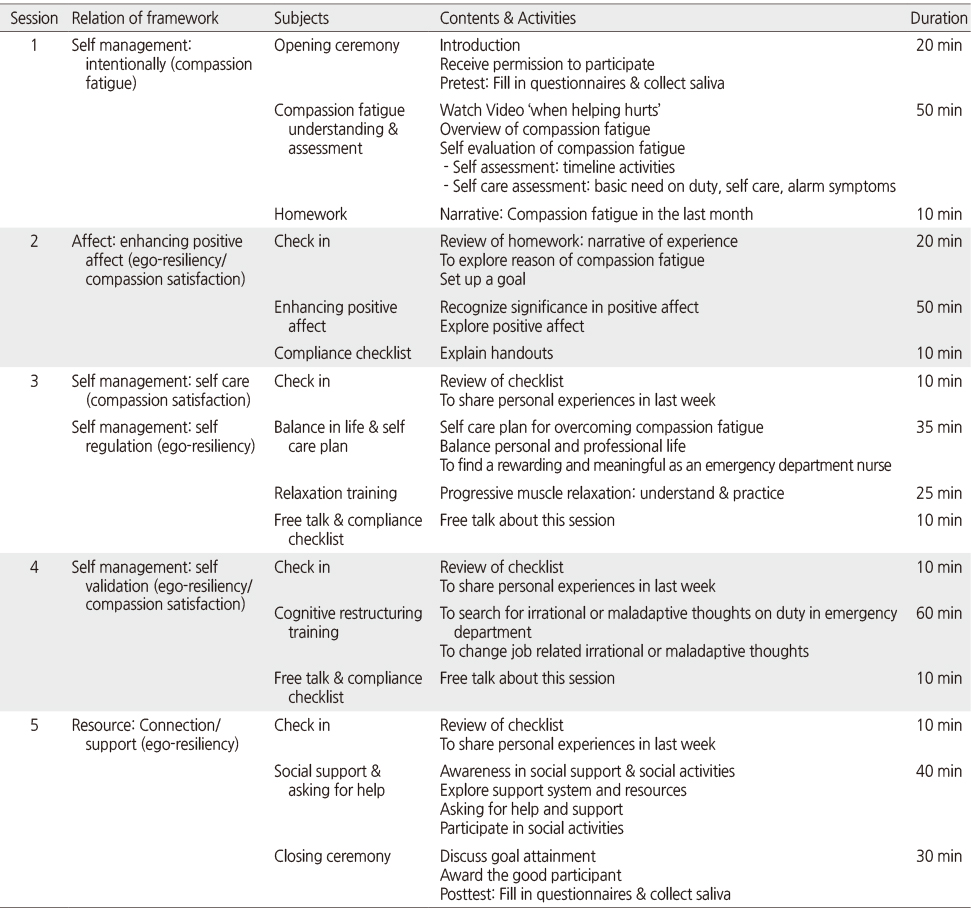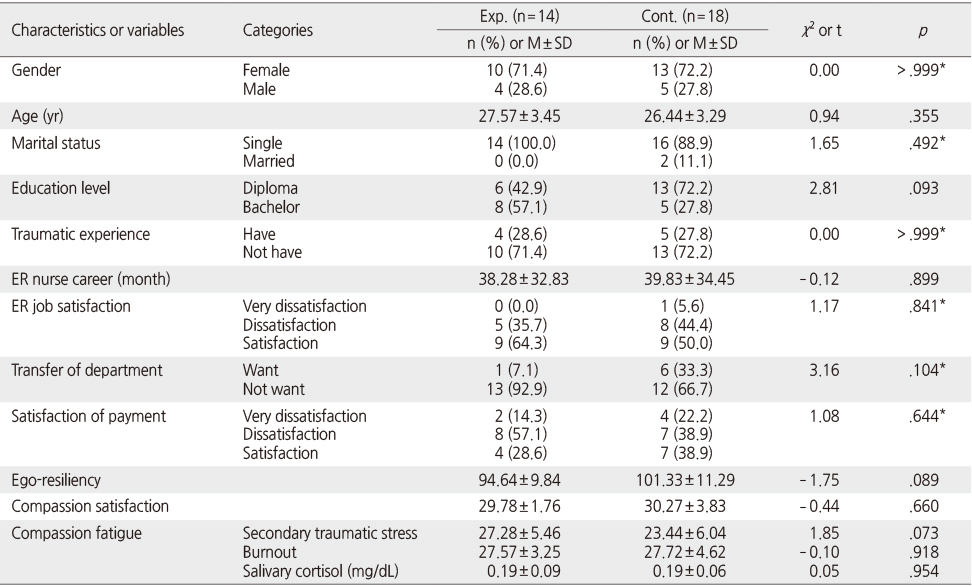Articles
- Page Path
- HOME > J Korean Acad Nurs > Volume 46(2); 2016 > Article
-
Original Article
- Development and Application of an Overcoming Compassion Fatigue Program for Emergency Nurses
- Yeong Ah Kim, Jeong Sook Park
-
Journal of Korean Academy of Nursing 2016;46(2):260-270.
DOI: https://doi.org/10.4040/jkan.2016.46.2.260
Published online: April 29, 2016
1Department of Nursing, Suseong College, Daegu, Korea.
2College of Nursing, Keimyung University, Daegu, Korea.
- Address reprint requests to: Park, Jeong Sook. College of Nursing, Keimyung University, 1095 Dalgubeoldae-ro, Dalseo-gu, Daegu 42601, Korea. Tel: +82-53-580-3907 Fax: +82-53-580-3916, jsp544@gw.kmu.ac.kr
© 2016 Korean Society of Nursing Science
This is an Open Access article distributed under the terms of the Creative Commons Attribution NoDerivs License. (http://creativecommons.org/licenses/by-nd/4.0/) If the original work is properly cited and retained without any modification or reproduction, it can be used and re-distributed in any format and medium.
Abstract
-
Purpose
- This study was conducted to develop a program to help emergency nurses overcome compassion fatigue, and to analyze the effects of the program.
-
Methods
- A nonequivalent control group pretest-posttest design was used. There were 14 participants in the experimental group and 18 subjects in the control group. The program was comprised of five, weekly 80-minute sessions including understanding and assessment of compassion fatigue, enhancing positive affect, balancing work-life, planning self care, training in relaxation techniques and cognitive restructuring, and getting social support. Research variables were ego-resiliency, compassion satisfaction and compassion fatigue of the ProQOL 5, and salivary cortisol. Data were analyzed using Chi-square test, independent t-test, and paired t-test.
-
Results
- The first hypothesis, "There will be a difference in scores for ego resiliency between the experimental group and the control group". was not supported. The second hypothesis, "There will be a difference in scores for compassion satisfaction between the experimental group and the control group" was supported (t=2.15, p=.046). The third hypothesis, "There will be a difference in scores for compassion fatigue between the experimental group and the control group" was not supported.
-
Conclusion
- The first program for emergency nurses to overcome compassion fatigue in Korea was effective in increasing emergency nurses' compassion satisfaction and decreasing salivary cortisol level in the experimental group. Therefore, this program for overcoming compassion fatigue is useful to increase emergency nurses' compassion satisfaction. However replication studies of short-term intensive program reflecting emergency nurses' opinion are needed.
This manuscript is a revision of the first author' doctoral dissertation from Keimyung University.
The authors declared no conflict of interest.
- 1. National Emergency Medical Center. 2013 statistics of emergency medical system [Internet]. Seoul, Author. 2014;cited 2016 March 3. Available from: http://www.nemc.or.kr/egen/inf.bor42.do?flag=4&strid=72761&strnum=1&pageflag=2
- 2. Kim SH. Severe emergency patients stay for 6 hours: 2013 emergency medical facility evaluation report [Internet]. Seoul, The Korean Nurses Association News. 2014;cited 2016 March 3. Available from: http://www.nursenews.co.kr/Article/ArticleDetailView.asp?typ=11&articleKey=1057
- 3. Dominguez-Gomez E, Rutledge DN. Prevalence of secondary traumatic stress among emergency nurses. J Emerg Nurs. 2009;35(3):199–204. ArticlePubMed
- 4. Flarity K, Gentry JE, Mesnikoff N. The effectiveness of an educational program on preventing and treating compassion fatigue in emergency nurses. Adv Emerg Nurs J. 2013;35(3):247–258. ArticlePubMed
- 5. Figley CR. Compassion fatigue as secondary traumatic stress disorder: An overview. In: Figley CR, editor. Compassion fatigue: Coping with secondary traumatic stress disorder in those who treat the traumatized. New York, NY: Brunner-Routledge; 1995. p. 1–20.
- 6. Schulte-Rüther M, Markowitsch HJ, Fink GR, Piefke M. Mirror neuron and theory of mind mechanisms involved in face-to-face interactions: A functional magnetic resonance imaging approach to empathy. J Cogn Neurosci. 2007;19(8):1354–1372. ArticlePubMedPDF
- 7. Gentry JE, Baggerly J, Baranowsky A. Training-as-treatment: Effectiveness of the certified compassion fatigue specialist training. Int J Emerg Ment Health. 2004;6(3):147–155.PubMed
- 8. Stamm BH. The concise ProQOL manual [Internet]. Pocatello, ID, ProQOL.org. 2010;cited 2012 September 2. Available from: http://www.proqol.org/uploads/ProQOL_Concise_2ndEd_12-2010.pdf
- 9. Joinson C. Coping with compassion fatigue. Nursing. 1992;22(4):116118–120.Article
- 10. Radey M, Figley CR. The social psychology of compassion. Clin Soc Work J. 2007;35(3):207–214. ArticlePDF
- 11. Klohnen EC. Conceptual analysis and measurement of the construct of ego-resiliency. J Pers Soc Psychol. 1996;70(5):1067–1079. ArticlePubMed
- 12. Chase MM. Emergency department nurses' lived experience with compassion fatigue [master's thesis]. Tallahassee, FL, Florida State University. 2005.
- 13. Robertson S, Gow KM. How burned out employees perceive work stress and organizational burnout. In: Gow KM, Marek CJ, editors. Way finding through life's challenges: Coping and survival. New York, NY: Nova Science Publishers; 2011. p. 385–402.
- 14. Sabo BM. Compassion fatigue and nursing work: Can we accurately capture the consequences of caring work? Int J Nurs Pract. 2006;12(3):136–142. ArticlePubMed
- 15. Hooper C, Craig J, Janvrin DR, Wetsel MA, Reimels E. Compassion satisfaction, burnout, and compassion fatigue among emergency nurses compared with nurses in other selected inpatient specialties. J Emerg Nurs. 2010;36(5):420–427. ArticlePubMed
- 16. Berger R, Gelkopf M. An intervention for reducing secondary traumatization and improving professional self-efficacy in well baby clinic nurses following war and terror: A random control group trial. J Emerg Nurs. 2011;48(5):601–610. Article
- 17. Potter P, Deshields T, Berger JA, Clarke M, Olsen S, Chen L. Evaluation of a compassion fatigue resiliency program for oncology nurses. Oncol Nurs Forum. 2013;40(2):180–187. ArticlePubMed
- 18. Potter P, Deshields T, Rodriguez S. Developing a systemic program for compassion fatigue. Nurs Adm Q. 2013;37(4):326–332. ArticlePubMed
- 19. Ahn YW. Adrenal exhaustion and fatigue due to chronic stress. J Korean Med Assoc. 2011;54(1):81–87. Article
- 20. Cohen J. Statistical power analysis for the behavioral sciences. 2nd ed. Hillsdale, NJ: Lawrence Erlbaum Associates; 1988.
- 21. Park HJ. Perceived stress, coping process and depression to egoresilience [master's thesis]. Seoul, Korea University. 1996.
- 22. Wilson J. Adrenal fatigue: The 21st century stress syndrome. Petaluma, CA: Smart Publications; 2001.
- 23. Seels B, Richey R. Instructional technology: The definition and domains of the field. Washington, DC: Association for Educational Communications and Technology; 1994.
- 24. Na EY. Experimental validation of 3-level attitude change model: Effects of in/outgroup sources and message strengths on the changes of weak, moderate, and strong attitudes. Korean J Soc Pers Psychol. 1999;13(1):65–90.
- 25. Grafton E, Gillespie B, Henderson S. Resilience: The power within. Oncol Nurs Forum. 2010;37(6):698–705. ArticlePubMed
- 26. Lim JS, Yoon MS. Moderating effects of ego-resilience, social support on the relationship between secondary traumatic stress and job satisfaction among mental health social workers. Ment Health Soc Work. 2014;42(1):31–60.
- 27. Pietrantoni L, Prati G. Resilience among first responders. Afr Health Sci. 2008;8:Suppl 1. S14–S20.PubMedPMC
- 28. Bartone PT, Hystad SW. Increasing mental hardiness for stress resilience in operational settings. In: Bartone PT, Johnsen BH, Eid J, Violanti JM, Laberg JC, editors. Enhancing human performance in security operations: International and law enforcement perspectives. Springfield, IL: Charles C. Thomas; 2010. p. 257–272.
- 29. Choi SY. Effect of horticultural therapy on the changes of salivary cortisol density and blood pressure of the hospital staff [master's thesis]. Seoul, Korea University. 2011.
- 30. Kim D, Chung YS, Park S. Relationship between the stress hormone, salivary cortisol level and stress score by self-report measurement. Korean J Health Psychol. 2004;9(3):633–645.
REFERENCES
Figure & Data
REFERENCES
Citations

- Effect of a Compassion Fatigue Intervention on Nurses’ Professional Quality of Life: A Single Group Study
Priyanka Singh, Nanda Kumar Paniyadi, Jaison Jacob, Anuradha Kumari, Roshna Lytton, Dishani Harh
Indian Journal of Palliative Care.2025; 31: 342. CrossRef - Effect of positive psychological capital on burnout in public hospital nurses: Mediating effect of compassion fatigue is greater than compassion satisfaction
Sin Ah Kim, Sung Reul Kim, Hye Young Kim
Japan Journal of Nursing Science.2024;[Epub] CrossRef - Occupational Stress- Addressing Woes of the Nurses in a Burn Unit
Kajal Gupta, Monaliza Monaliza, Karobi Das, Ramesh Kumar Sharma
Hospital Topics.2023; 101(3): 184. CrossRef - Interventions to reduce burnout among clinical nurses: systematic review and meta-analysis
Miran Lee, Chiyoung Cha
Scientific Reports.2023;[Epub] CrossRef - Psychological Intervention to Promote Resilience in Nurses: A Systematic Review and Meta-Analysis
Suk-Jung Han, Young-Ran Yeun
Healthcare.2023; 12(1): 73. CrossRef - Factors Affecting Turnover Intention of Clinical Nurses in a Tertiary Hospital: Focusing on Fatigue, Nursing Professionalism, and Compassion Satisfaction
Jiyeon Song, Minjeong An
The Korean Journal of Rehabilitation Nursing.2022; 25(1): 40. CrossRef - Рrofessional burnout of naval personel and ways of its psychophysiological correction: a review
P. A. Soshkin, A. G. Zaytsev, D. S. Zabrodskiy
Marine Medicine.2022; 8(2): 19. CrossRef - The Effectiveness and Safety of Mind-Body Modalities for Mental Health of Nurses in Hospital Setting: A Systematic Review
Su-Eun Jung, Da-Jung Ha, Jung-Hyun Park, Boram Lee, Myo-Sung Kim, Kyo-Lin Sim, Yung-Hyun Choi, Chan-Young Kwon
International Journal of Environmental Research and Public Health.2021; 18(16): 8855. CrossRef - Effect of Expressive Writing on Professional Quality of Life and Resilience among Intensive Care Unit Nurses
Danbi You, Hye-Ja Park
Journal of Health Informatics and Statistics.2021; 46(3): 276. CrossRef - Sociological conceptualizations of compassion fatigue: Expanding our understanding
Christian Vaccaro, Melissa Swauger, Shayna Morrison, Alex Heckert
Sociology Compass.2021;[Epub] CrossRef - Effectiveness of a Cognitive-Behavioral Stress Management Program on Psychosocial Stress, Mood State, and Ways of Coping for Emergency Department Nurses
Ja-Hyun Kim, Kuem-Sun Han
Korean Journal of Stress Research.2021; 29(2): 87. CrossRef - Effect of a compassion fatigue resiliency program on nurses’ professional quality of life, perceived stress, resilience: A randomized controlled trial
Tuğba Pehlivan, Perihan Güner
Journal of Advanced Nursing.2020; 76(12): 3584. CrossRef - The effects of empathy and self concept on problem solving: Focusing on the mediating effect of communication of nursing students
Young Hui Hwang, Sun Jung Park
The Journal of Korean Academic Society of Nursing Education.2020; 26(4): 348. CrossRef - Effectiveness of interventions to reduce occupational stress among emergency department staff: a systematic review protocol
Hui (Grace) Xu, Kathryn Kynoch, Anthony Tuckett, Robert Eley, Peter Newcombe
JBI Database of Systematic Reviews and Implementation Reports.2019; 17(4): 513. CrossRef - Compassion satisfaction and compassion fatigue among medical social workers in Korea: the role of empathy
Jaehee Yi, Min Ah Kim, Kwonho Choi, Brian A. Droubay, Soohyun Kim
Social Work in Health Care.2019; 58(10): 970. CrossRef - Prevention Actions of Burnout Syndrome in Nurses: An Integrating Literature Review
Sidney Medeiros de Oliveira, Luiz Vinicius de Alcantara Sousa, Maria do Socorro Vieira Gadelha, Vânia Barbosa do Nascimento
Clinical Practice & Epidemiology in Mental Health.2019; 15(1): 64. CrossRef - The Effects of Violence Coping Program Based on Middle-Range Theory of Resilience on Emergency Room Nurses' Resilience, Violence Coping, Nursing Competency and Burnout
Seung Min Lee, Kyung Mi Sung
Journal of Korean Academy of Nursing.2017; 47(3): 332. CrossRef
Overcoming Compassion Fatigue Program
Homogeneity Test of General Characteristics and Dependent Variables (N=32)
*Fisher's exact test; Exp.=Experimental group; Cont.=Control group.
Effect of Overcoming Compassion Fatigue Program in Ego-resiliency, Compassion Satisfaction, Compassion Fatigue (N=32)
Exp.=Experimental group; Cont.=Control group.
*Fisher's exact test; Exp.=Experimental group; Cont.=Control group.
Exp.=Experimental group; Cont.=Control group.
 KSNS
KSNS
 E-SUBMISSION
E-SUBMISSION



 Cite
Cite

